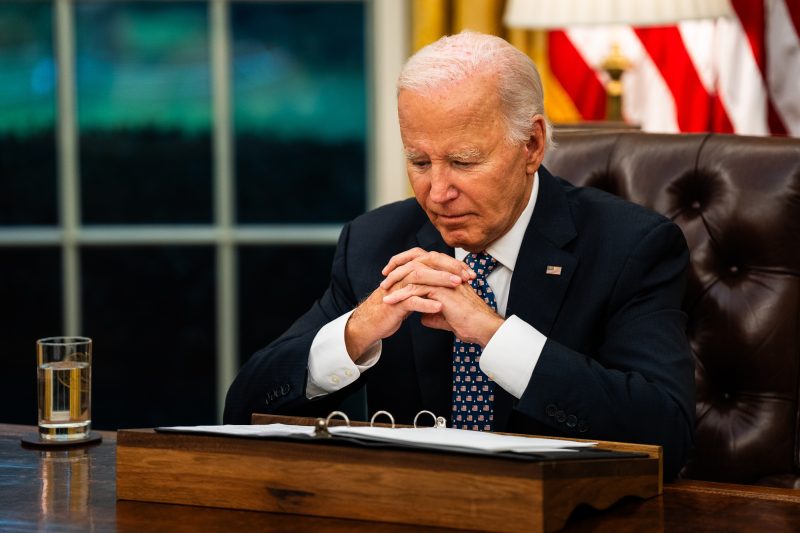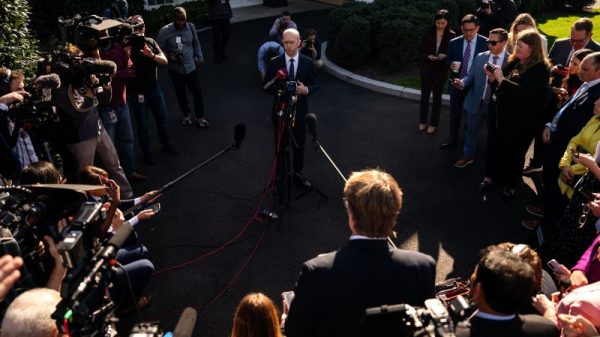First Israel ignored a U.S.-led effort to impose a cease-fire in its escalating war against Hezbollah. Then it killed the militant movement’s leader, Hasan Nasrallah, in a massive attack, taking Washington by surprise. Now, following a weekend scramble to avert a ground invasion of Lebanon, Israel is conducting exactly that, underscoring Prime Minister Benjamin Netanyahu’s disregard for the Biden administration’s entreaties and the limits of its influence on his actions.
The widening gap between U.S. desires and Israeli behavior has left the administration struggling to adapt its diplomatic efforts to accommodate Netanyahu’s impulses. This chasm between the two allies has become especially pronounced in the days since the White House promised on Wednesday that Israel and Lebanon were about to agree to a cease-fire deal, only to end up a bystander as Netanyahu vowed at the United Nations to wipe out Hezbollah’s ability to threaten Israel for the foreseeable future.
With many U.S. officials now embracing Israel’s success as it proceeds, with stunning momentum, to degrade Hezbollah, the events of recent weeks appear to fit a pattern in which the administration urges against specific Israeli actions only to later backtrack so it can avoid imposing conditions on military aid.
President Joe Biden has made clear his desire for an immediate halt to the fighting. Asked at the White House on Monday whether he was aware that Israel was preparing a limited incursion into Lebanon, he said: “I’m more aware than you might know, and I’m comfortable with them stopping. We should have a cease-fire now.”
The Biden administration claims that it has been able to shape Israeli policy in recent days, most recently convincing Netanyahu this weekend to launch only a limited ground incursion into southern Lebanon rather than the full-scale invasion he had been contemplating. But U.S. officials have been forced repeatedly to revise their red lines, retroactively justifying Israeli decisions that ahead of time they declared would be foolhardy.
U.S. officials have been split over the wisdom of the Israeli campaign against Hezbollah, especially since Friday’s killing of Nasrallah. Some say that if a major blow can be dealt to the militant organization without sparking a wider regional conflict that draws in Iran, then that may count as a success. Others are more focused on the risks.
“We of course continue to support a cease-fire,” State Department spokesman Matthew Miller told reporters Monday. “But at the same time, there are a couple other things that are true as well, which is that, number one, military pressure can, at times, enable diplomacy. Of course, military pressure can also lead to miscalculation. It can lead to unintended consequences, and we’re in conversation with Israel about all these factors now.”
The events of the last year have shown the limits of the Biden administration’s ability to influence Israel.
“It’s minimal,” said Richard Haass, president emeritus of the Council on Foreign Relations. “We’ve had basically 12 months where the administration has advocated one thing and Israel has done something else, in Gaza. In the last few days you had a situation where Israel again acted unilaterally in the sense of not coordinating with us beforehand. And in this case again, the administration seemed to be on a different page, calling for a cease-fire when the Israelis had no interest in a cease-fire.”
The degree to which the two sides appear to be talking past each other was readily apparent last week on the sidelines of the U.N. General Assembly, where senior U.S. officials assembled an international coalition that backed a cease-fire between Israel and Hezbollah. The deal was announced late Wednesday, only to be followed by silence from the Israeli side on Thursday. By Friday, senior Israeli officials were telling reporters that they had never seriously contemplated the cease-fire terms and that Netanyahu’s intention was to keep pushing forward while Hezbollah was reeling.
U.S. policy has evolved as Israel has pressed ahead. Some Biden administration officials have come around to the idea of Israel trying to deliver a decisive blow to Hezbollah when the group is in crisis. Two senior U.S. officials said the calculus has changed from just a few weeks ago, given the militant group’s weakened state. The officials, like others, spoke on the condition of anonymity to talk frankly about sensitive discussions.
While the Biden administration has focused much of its efforts for nearly a year on preventing an escalation between Israel and Hezbollah, some officials have been impressed by Israel’s operation. . After Israel crippled Hezbollah’s communications and killed much of its senior leadership, they acknowledge that the situation now is starkly different, noting that Israel is in its strongest position since the two sides began regularly trading fire a year ago after the start of the war in Gaza.
Still, senior officials over the weekend said they were advising Israel against a ground invasion of Lebanon, warning that such a move could backfire by building political support for Hezbollah inside the country and unleashing unpredictable consequences for civilians and Iranian involvement.
It has not always been clear that Israeli officials are communicating their goals to their U.S. counterparts.
At the military-to-military level, there’s a “professional honest exchange of assessments on the ground,” said Ellen Laipson, director of the international security program at George Mason University and a Middle East expert. At the political level, “I just don’t know if that conversation is as honest as it needs to be. Are the Israeli leaders that have the authority really telling us what their political objectives are and what’s achievable or not?”
The lack of communication has stymied the U.S. ability to have input into how the war is prosecuted — with risks for Washington as it marshals U.S. forces to the region in a bid to warn Iran against retaliation.
If Israel’s incursion is limited to the border areas to prevent another assault on its people, then “it’s possible” the military can pull it off, said Michael Young, senior editor at the Carnegie Middle East Center in Beirut. But if the goal is to push Hezbollah back to the Litani River, about 20 miles from Lebanon’s southern border with Israel, “there’s definitely potential for the Israelis to bog down,” he said.
A U.N. resolution put in place to end the 2006 Israel-Lebanon war called for Hezbollah to pull back its forces north of the river. But the resolution has no enforcement mechanism, and Young said he suspects that the Israelis might want to take land as leverage to force Hezbollah to comply and pledge to stay there.
But “a ground war is more complicated for the Israelis because Hezbollah knows the terrain,” Young said. And even if Hezbollah pulls back now, he said, “I don’t know how you can prevent a redeployment of Hezbollah to the border.”
As they awaited Israel’s next move, Biden administration officials were closely watching for a reaction from Iran, where clear divisions have emerged between the new government of President Masoud Pezeshkian, who called for international solidarity in support of both Lebanon and Hezbollah, and an Iranian military itching for payback.
Particularly within the elite Islamic Revolutionary Guard Corps (IRGC), “there is a lot of discontent … that if Iran had taken bigger risks, it would not have basically signaled to the United States and Israel that they can get away with this kind of decapitation of the Iranian military and its allies” such as Hezbollah, said Ali Vaez, head of the Iran program at the International Crisis Group.
Iran’s biggest risk — a massive missile and drone barrage toward Israel after it killed senior IRGC commanders in a Syrian airstrike in April — was repelled by Israeli and U.S. air defenses. After the late-July assassination of Hamas political leader Ismail Haniyeh in a Tehran guesthouse the day after Pezeshkian’s inauguration, the administration and its allies persuaded Iran not to retaliate, lest it upset Gaza peace negotiations they insisted were on the verge of success.
The United States was “lying” about its efforts to arrange a Gaza cease-fire between Israel and Hamas, Pezeshkian said in an interview last week as Israeli airstrikes intensified in Lebanon. He called for the Islamic world to join together and not “abandon” Hezbollah.
But Pezeshkian’s so-called “moderate” government may now see its options as limited.
“I think they’ve come to the conclusion that the policy of restraint” that Iran believes it demonstrated over the past few weeks in the face of Israel’s relentless assault on Hezbollah was “goading them into a trap,” Vaez said. Now, with their strongest proxy in the region on its knees, “they realize that their restraint was the trap.”
Still, Tehran has been consistent in seeking to avoid any confrontation that would draw in the United States, analysts said.
“Iran understands that if it were to attack Israel today, the Israeli response would be much more powerful than the restrained response it had in April,” said Matthew Levitt, an expert on Hezbollah at the Washington Institute for Near East Policy. “The one thing that Iran doesn’t want” is for any regional war to “cross the borders into Iran,” he said. “That’s their red line.”





























